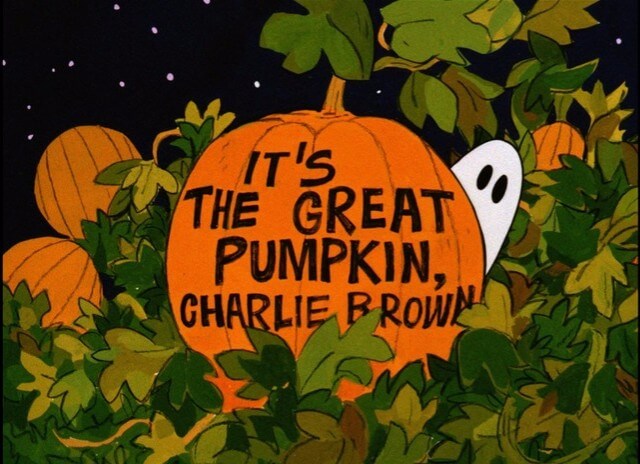
Halloween is nearly upon us in many parts of the world, and with the season comes the seasonal traditions millions of people celebrate in different ways and by different names. In the United States one of the most iconic symbols of the season is, of course, the pumpkin. Whether intact, carved into Jack O’Lanterns, baked into sweets, or reduced to a powdery spice added to any other imaginable foodstuffs, pumpkins are the Christmas Trees of the Hallowmas Period.
Perhaps nowhere is this near deification of the pumpkin at Halloween more brilliantly depicted than in the famous Peanuts cartoon It’s the Great Pumpkin, Charlie Brown!
Spoiler Alert
The titular plot of It’s the Great Pumpkin centers on the character of Linus, and his belief in a supernatural being called the Great Pumpkin, who is to Halloween what Santa Clause is to Christmas or the Easter Bunny to Easter. According to Linus, the Great Pumpkin rises each year from the ‘sincerest’ pumpkin patch, and flies through the air with toys for all the children, or at least all the children who believe in him.
Linus proceeds to stake out a pumpkin patch he deems sufficiently sincere, and skips the partying and trick-or-treating his friends engage in. Sally, who has a crush on him, even joins him. Of course, the Great Pumpkin never appears, Linus and Sally miss out on all the fun, and Linus loses the treats and the girl. In a final moment of defiance, when Charlie Brown suggests perhaps the Great Pumpkin might not be real after all, Linus avows he will find an even more sincere patch the next time, when the Great Pumpkin is sure to appear.
The Lesson for Marketers
Googling ‘Authenticity Marketing’ will bring up innumerable blogs and articles touting the value of Authenticity for businesses, brands, and personal brands (especially the latter). While the popular buzzword is ‘Authenticity’, what they’re really trying to say, like Linus, is ‘Sincerity’. Authenticity, to use the term accurately, is the quality of being of unquestionable origin, and is related to ‘authoritative’. Collectors Items come with Certificates of Authenticity, marketers do not.
[clickToTweet tweet=”Collectors Items come with Certificates of Authenticity, marketers do not. #MarketingTips” quote=”Collectors Items come with Certificates of Authenticity, marketers do not.”]
In Truth Will Out – Why Authenticity is the Key to Growing Your Business, James T. Noble states that, “Simply put, being authentic means staying true to who you are, what you do and who you serve.”
David Kutcher of Confluent Forms, in a Google+ Post, put it even more succinctly: “What is an authentic interaction? An interaction based on knowing the other person’s goals in doing/saying what they’re doing/saying, and accepting them at face value.”
Compare these definitions with Sincerity, which is the quality of being free of pretense, deceit, or hypocrisy, i.e. “being and staying true to who you are”. When marketers speak of Authenticity, they almost invariably mean what Linus meant by Sincerity.
This is where the danger arises of falling for the ‘Great Pumpkin Delusion’: that if a marketer is the sincerest marketer in all the world, the marketing gods will smile upon him or her with gifts of traffic, conversions, leads, professional esteem, and wealth. Surely they will see that ours is the sincerest marketing patch there ever was in all the lands!
Sincerity, to be fair, is a great personal quality, and by its very nature demands consistency: we can’t behave according to one set of principles in our private lives, and an entirely oppositional set in our professional lives, and claim very much in the way of ‘sincerity’. This, however, should be viewed more in the light of a baseline than an achievement. I can only pray for the soul, metaphorically speaking, of anyone who needed to become a marketer to learn how to be sincere.
Like Linus, it’s all-too-easy to sit around feeling smug in our sincerity, only to become embittered as others, perhaps less ‘sincere’ than we, reap all the benefits, the ‘treats’ of their efforts. In fact, it was the ‘less sincere’ characters in the story, those who wore their masks to hide their true identities and who went around town threatening neighbors with malicious acts unless given candy (the literal meaning of ‘Trick or Treat’), the two-faced ‘hard sell’ marketers, who came home with the best haul, while Linus and his female admirer were left out in the literal and proverbial cold.
Being ‘Sincere’ or ‘Authentic’ and $1.25 will buy you a cup of coffee, and it won’t be any cheaper, taste any better, or require any less effort to obtain. Had Linus ‘done the hard work’ of creating a costume and pounding-the-pavement alongside his friends, he’d have come home laden with the very rewards he’d wished for, and he needn’t have sacrificed one iota of his sincerity in doing so. Yet, stubborn as a mule, Linus clung to his belief in the supernatural virtue of mere sincerity, even as it denied him the very benefits it claimed to guarantee, no effort required.
At Close of Business, the bottom line remains the bottom line: are you delivering results, for yourself and your clients, or are you waiting for some magical reward just for doing ‘the right thing’? The best form of Authenticity Marketing is doing an authentically good job.
[clickToTweet tweet=”The best form of Authenticity Marketing is doing an authentically good job. #MarketingTips” quote=”The best form of Authenticity Marketing is doing an authentically good job.”]